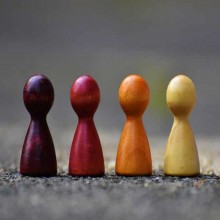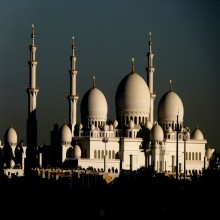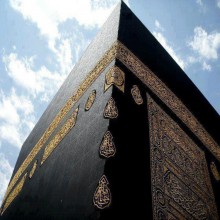O mankind, We have created you male and female, and appointed you races and tribes, that you may know one another. Surely the noblest among you in the sight of God is the most God-fearing of you. God is All-knowing, All-aware
The Qur’ān was revealed to the Prophet Muhammad peace be upon him at a time when racism was rampant. The Arabs considered themselves to be superior to the non-Arabs. The wealthy considered themselves superior to the poor, and the masters considered themselves superior to their slaves. When one reads the Qur’ān they will immediately notice that it seeks to do away with racism. It reminds humans that God created us all different for a reason, that we may know each other. Racism is not only interracial, but it is also intraracial. Meaning, that one can even find racism within certain ethnicities and races. If all humans were identical, we would not be able to tell each other apart. Further, diversity is a blessing. If we all ate looked, dressed, ate, and spoke in an identical manner life would be quite boring.
The Qur’ān highlights the importance of human diversity:
(Qur’ān 49:13)
The Qur’ān highlights the importance and necessity of racial diversity and it is to be celebrated. Racism is indeed superficial because under our very thin layer of skin, we are all the same. We are all made up of the same meat, blood, and bones. When we die, we all end up the same, as dust.
The Prophet Muhammad peace be upon him reiterated this message in his final sermon. This was his farewell sermon where he addressed the Muslim community at large one last time before the end of his life. He said:
All mankind is from Adam and Eve, an Arab has no superiority over a non-Arab nor a non-Arab has any superiority over an Arab; also a white has no superiority over a black nor a black has any superiority over a white – except by piety and good action. Learn that every Muslim is a brother to every Muslim and that the Muslims constitute one brotherhood. Nothing shall be legitimate to a Muslim which belongs to a fellow Muslim unless it was given freely and willingly. Do not therefore do injustice to yourselves. Remember one day you will meet Allah and answer your deeds. So, beware: do not stray from the path of righteousness after I am gone.
During his lifetime, some of the wealthy Arabs were considering becoming Muslim. However, they said they would only come to learn about Islam under the condition that they have their own sessions which did not have any poor or slaves in attendance. The Prophet peace be upon him contemplated this out of desire that they might accept his message. However, Allah revealed a verse which rejected any such conditions and reminded the Prophet peace be upon him to stick with those who only seek God, even if they are poor.
And keep yourself patient [by being] with those who call upon their Lord in the morning and the evening, seeking His countenance. And let not your eyes pass beyond them, desiring adornments of the worldly life, and do not obey one whose heart We have made heedless of Our remembrance and who follows his desire and whose affair is ever [in] neglect. And say, “The truth is from your Lord, so whoever wills – let him believe; and whoever wills – let him disbelieve
(Qur’ān 18:28-29)
These verses show that Islam will not compromise of its teachings of equality among all people. The verses rebuke the idea that there should be a distinction between the wealthy and poor, or the black and the white. Rather, they clearly state that this, Islam and equality of all people, is the truth from God. Whoever wants to accept it as is, is free to do so, and whoever wishes to reject it may also do so.
However, Islam takes this concept of equality even further. It is not limited to theory, but equality is embedded in the rituals of Islam. When Muslims perform their five daily prayers in congregation, everyone stands together in a straight line, shoulder to shoulder. There is no distinction or special place for anyone to stand based on any kind of status. Pilgrimage is perhaps the greatest ritual which instills the teaching that all humans are equal. Everyone wears two pieces of white cloth, and there are millions of people there from all walks of life who are identical before God. They have nothing but two pieces of white cloth on them which reminds them of their humanity. The black and the white are equal, the poor finally feels a sense of equality with the rich, and the servant feels equal to the king. They all stand before God with nothing but their humanity.
This is what changed Malcolm X from calling the white man the devil, to believing that all people are equal. I end with a quote from his letter from Mecca:
During the past eleven days here in the Muslim world, I have eaten from the same plate, drunk from the same glass, and slept in the same bed (or on the same rug)–while praying to the same God–with fellow Muslims, whose eyes were the bluest of blue, whose hair was the blondest of blond, and whose skin was the whitest of white. And in the words and in the actions in the deeds of the ‘white’ Muslims, I felt the same sincerity that I felt among the black African Muslims of Nigeria, Sudan, and Ghana.
We were truly all the same (brothers)–because their belief in one God had removed the white from their minds, the white from their behavior, and the white from their attitude.






